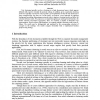Free Online Productivity Tools
i2Speak
i2Symbol
i2OCR
iTex2Img
iWeb2Print
iWeb2Shot
i2Type
iPdf2Split
iPdf2Merge
i2Bopomofo
i2Arabic
i2Style
i2Image
i2PDF
iLatex2Rtf
Sci2ools
130
click to vote
IIS
2003
2003
Ontology-based Text Document Clustering
Text clustering typically involves clustering in a high dimensional space, which appears difficult with regard to virtually all practical settings. In addition, given a particular clustering result it is typically very hard to come up with a good explanation of why the text clusters have been constructed the way they are. In this paper, we propose a new approach for applying background knowledge during preprocessing in order to improve clustering results and allow for selection between results. We preprocess our input data applying an ontology-based heuristics for feature selection and feature aggregation. Thus, we construct a number of alternative text representations. Based on these representations, we compute multiple clustering results using KMeans. The results may be distinguished and explained by the corresponding selection of concepts in the ontology. Our results compare favourably with a sophisticated baseline preprocessing strategy.
Alternative Text Representations | IIS 2003 | Information Technology | Particular Clustering | Text Clustering |
Related Content
| Added | 31 Oct 2010 |
| Updated | 31 Oct 2010 |
| Type | Conference |
| Year | 2003 |
| Where | IIS |
| Authors | Steffen Staab, Andreas Hotho |
Comments (0)

